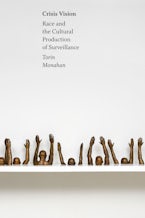"A methodical and insightful account of the cultural production of differential systems of oppression that characterize the surveillant present. . . . What’s notable throughout is the incisiveness of Monahan’s critique which refuses to shy away from scrutiny even as he lauds each artwork for its investigation of crisis vision."
- Gary Kafer (Journal of Cultural Economy) "The contribution of Monahan’s Crisis Vision: Race and the Cultural Production of Surveillance to the surveillance studies body of work is unique in its line of inquiry and the theoretical tools that it gifts to the intersectional field of surveillance studies scholars and artists."
- Ausma Bernot (International Journal for Crime, Justice and Social Democracy) "Crisis Vision offers a richly textured methodological framework for better understanding the myriad ways in which visuality is put to the service of surveillance cultures rooted in racial prejudice and violence. Monahan 's call for a disruptive politics rooted in relations of collective opacity, and his thoughtful deliberation on contemporary art practices that answer this call, is a most welcome addition to the field of critical surveillance studies."
- Claudette Lauzon (Surveillance & Society) "In many ways, Crisis Vision mirrors the artists featured throughout its pages by challenging current and future critical/cultural communication studies scholars to consider their roles within these systems in an ever-evolving digital age. Monahan offers scholars an illuminating work that both presents a vital new theory describing how racial systems persevere through our digital age, while also magnifying marginalized voices and their aspirations toward peace and the freedom to exist." - Jacob Pedersen (Southern Communication Journal) "Crisis Vision is both an exemplary cultural critique of racialized surveillance and a celebration of makers whose works interrupt this status quo. . . . Crisis Vision provides its readers with an aesthetic vocabulary for refusing assimilation by surveillant logics, seeking instead to dismantle them through depiction." - Atilla Hallsby (Cultural Studies)

